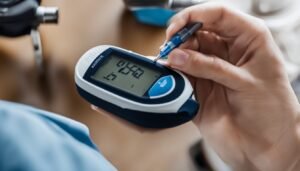Diabetes affects how our bodies use glucose, the main sugar in our blood.1 When we eat, our blood sugar goes up. The pancreas responds by releasing insulin. But, for people with diabetes, something goes wrong. Their bodies can’t use insulin properly or don’t make enough. This keeps glucose in the blood, hurting our eyes, kidneys, nerves, and heart.1 We’re not sure what starts diabetes, but being overweight and not being active are big risks.1 Doctors find out if someone has diabetes through blood tests.
Getting screened for diabetes is important.2 It’s for people who might be at risk and want to know more. Knowing this helps them make healthy choices.2 They should tell their regular doctor what the test finds.
At Midwest Express Clinic, you can get checked quickly. They do tests right there, help manage your medicine, and connect you with experts. These steps are important for handling diabetes well.3
- Diabetes changes how your body uses glucose, leading to high blood sugar.
- Tests are key to making a diabetes diagnosis, and they check how likely someone is to get it.
- Midwest Express Clinic offers many services for diabetes care, like tests, medicine help, and finding specialists.
- Keeping up with tests and watching how you’re doing is vital in controlling diabetes and stopping problems.
- After getting a diabetes check, it’s smart to tell your usual doctor about the results.
Understanding Diabetes: What It Is and Why Testing Matters
Defining Type 1 and Type 2 Diabetes
Diabetes changes how your body handles sugar, or glucose, in the blood.4 Insulin is a key hormone. It moves sugar from your blood into cells for energy. But, with diabetes, your body either doesn’t make enough insulin or can’t use what it makes. This leads to too much sugar in your blood. High blood sugar is harmful without control, causing serious health issues.4
Risk Factors and Common Symptoms
Type 2 diabetes, occurring mainly in adults, is the common type.3 Its exact cause is not fully understood. However, being obese and inactive increases the risk significantly.3 People with type 2 diabetes might not feel any different for years. But signs like blurry vision, slow-healing infections, and more could show up earlier.3
The Importance of Early Detection and Monitoring
Testing early for diabetes is extremely important.3 Many people don’t know they have it. Yet, over 7 million Americans are living with undiagnosed diabetes.3 One in three adults is also at risk of getting type 2 diabetes.3 Finding it early allows for better control and can prevent serious diseases down the line.4
For easier monitoring, CGM devices check your blood sugar in real time.3 They reduce the need for constant finger pricks. Yet, they give you and your doctor important information.3 Walgreens and other pharmacies offer support for people dealing with diabetes.3
Types of Diabetes Tests and Screenings
Diabetes is diagnosed through blood tests that check glucose (sugar) levels.5 Doctors look for high glucose levels to determine diabetes, prediabetes, and gestational diabetes.5 If your blood glucose is high, you may need more tests to confirm diabetes.
Testing for type 2 diabetes is usual if you have certain risk factors. These include your age, ethnicity, weight, and if you had gestational diabetes.5
Blood Sugar Tests: Fasting and A1C
There are key blood tests for diabetes, like the fasting plasma glucose and A1C.5 To check for diabetes and prediabetes, doctors also use other tests. These include the fasting plasma glucose, A1C, random plasma glucose, glucose challenge, and oral glucose tolerance tests.5
The results show if your blood sugar is normal, prediabetes, or diabetes. They look at your A1C, fasting plasma glucose, and other test results.5
Urine Tests for Detecting Kidney Disease
For those with diabetes, regular urine tests help check kidney health.4 These tests find small amounts of albumin in the urine. They also include a GFR test to measure how well the kidneys filter waste.4
Eye and Foot Examinations
People with diabetes need to regularly check their eyes and feet.4 It’s vital for them to have enhanced tests as part of their usual check-ups. This tracks their A1C, and checks the health of their kidneys, eyes, and feet.4

Finding Convenient Diabetes Testing Locations Near You
Looking for a diabetes test center close to you is very important for your health care. Good news is, you have many places to choose from. These include local clinics, health centers, hospitals with testing setups, and even mobile units. These mobile units often visit different neighborhoods making health checks easier for many.
Local Clinics and Health Centers
Local clinics and health centers are great places to look for diabetes testing. The American Diabetes Association® (ADA) website can help you find these places.3 It also has a test to check how likely you are to get type 2 diabetes. Knowing this helps you take steps to prevent it.
Hospital-Based Testing Facilities
Hospitals and health systems have labs specifically for diabetes tests. They can do blood sugar checks, A1C tests, and look for other conditions like kidney problems.4 Getting tested at a hospital often means you get expert care.
Mobile Testing Units and Community Outreach Programs
There are also mobile units and community programs for diabetes testing. These can make a big difference for people who can’t easily get to a health center. For example, Midwest Express Clinic offers various diabetes care services right in your neighborhood.
It’s wise to check out all the diabetes testing choices in your area. This helps you pick the easiest way to take care of your health. Starting with a diabetes risk test is the first step to managing your health better.
Preparing for Your Diabetes Test
To prepare for your diabetes test, following the guidelines is crucial.4 It’s advised to fast for 9-12 hours before the screening. This ensures the most accurate results.4 Skipping food and certain drinks helps your doctor see your true blood sugar levels. This is vital for a correct diabetes diagnosis and management.
Fasting Requirements
When fasting, you can drink water but nothing else, including coffee, tea, or juices.6 This rule stands 8-12 hours prior to your test.6 It removes any food or drink effects on your blood sugar. This way, your results will be as precise as possible.
Bringing Relevant Medical Information
Besides fasting, ensure you bring important medical information to your test.4 This involves your medical and family history, current meds, and other health issues you might have.4 Sharing this with your doctor allows for a deeper understanding of your results. It also helps in crafting a diabetes management plan that suits you.
These easy steps are key to getting accurate and useful results from your diabetes test. Following them aids your healthcare team in making the best choices for your health.
Interpreting Your Diabetes Test Results
It’s vital to understand your diabetes test results to take control of your health. Pay specific attention to your blood sugar and A1C numbers.
Understanding Blood Sugar Levels and A1C Values
Your doctor looks at two main tests to see your blood sugar status, fasting and oral glucose tests.7 They judge if it’s normal, prediabetes, or diabetes based on the numbers. For fasting tests, below 100 mg/dL is normal, 100-125 mg/dL is prediabetes, and 126 mg/dL or higher is diabetes.7 With the oral test, under 140 mg/dL is normal, 140-199 mg/dL is prediabetes, and 200 mg/dL or more is diabetes.7 Your A1C results also play a big role, showing your last 2-3 months of blood sugar levels.
Discussing Results with Your Healthcare Provider
Talk to your healthcare team about your diabetes tests. They can give advice tailored to you and your health.4 They’ll think about your age, general health, and any other conditions that link to diabetes, like heart and kidney problems.4 Working together, you can aim to keep your blood sugar in check and lower the chance of diabetes issues.
where to get tested for diabetes near me
Looking for where to get tested for diabetes near me? You’ve got some good choices. The first source doesn’t help much. But the second and third sources share useful info.
Online Resources for Finding Local Testing Sites
The ADA website has a cool diabetes risk assessment. It tells you your risk for type 2 diabetes. This test can show if you’re likely to get diabetes. And, it helps you find diabetes testing locations near you.3
Using GPS and Map Applications
Midwest Express Clinic makes getting tested for diabetes easy. With urgent care and labs, you don’t need an appointment. This means no waiting. Using GPS and map applications, you can find the local diabetes testing sites near you.
Managing Diabetes: Treatment Options and Lifestyle Changes
Managing diabetes well needs a mix of lifestyle changes, self-care, and medicine. The goal of these plans is to keep blood sugar levels healthy and to avoid serious issues like heart disease and stroke.8
Medications and Insulin Therapy
For some, diabetes means taking medications and using insulin. This helps keep their blood sugar normal. Using these with other health strategies can prevent big health problems.8
Dietary Modifications and Exercise Routines
Eating right and staying active are key for people with diabetes. A good diet and exercise improve how well your body uses insulin. They also keep you strong and healthy.3
Continuous Glucose Monitoring (CGM) Devices
Now, there are Continuous Glucose Monitoring (CGM) devices. They’re great for keeping an eye on glucose non-stop. They make it easier to track trends and give warnings, which means no more poking your finger all the time.38
Use medicine, eat well, work out, and add CGM devices to take charge of diabetes. This way, you can lower the chance of serious health problems.38
The Role of Regular Testing in Diabetes Management
Testing and watching carefully are key in managing diabetes well. People check their blood sugar levels, how well their medications work, and look for any early problems. This way, they can stay healthy and avoid big issues in the future.9
Monitoring Blood Sugar Levels
Keeping an eye on blood sugar is a must for those with diabetes. A test like the Hemoglobin A1c shows average sugar levels over a few months. It helps spot diabetes early and sees how well it’s being managed.9 Knowing these average levels is important. High levels can mean prediabetes or diabetes, which may cause major health problems.9
Tracking Medication Effectiveness
Watching how well diabetes medicines work is crucial. A Comprehensive Metabolic Panel (CMP) blood test looks at blood’s key components. It checks things like metabolism, liver and kidney function.9 This test can find issues like diabetes, diseases involving the kidneys and liver, or imbalances in electrolytes.9
Detecting Complications Early
Early tests are vital to catch diabetes complications soon. These can be kidney, nerve, or heart problems. Checking blood pressure, cholesterol, and kidney health regularly finds issues before they get serious.10 Finding these early lets people with diabetes start the right treatments. This lowers the chance of severe harms over time.9
Taking testing and monitoring seriously is essential for good diabetes care and overall health. By staying on top of their health markers, those with diabetes and their doctors can make better care plans. This helps avoid problems and leads to a better life.910
Overcoming Barriers to Diabetes Testing
The journey to diabetes testing may have hurdles, but they can be passed with support and a positive attitude. We will look at ways to tackle these issues, so everyone can check their health without worry.
Addressing Cost Concerns
The price of diabetes tests can put people off. Yet, there’s help to lessen this burden. The American Diabetes Association is doubling donations up to $100,000 for more affordable testing.11 Also, Project Power gives free help to lower diabetes risk in both adults and kids.11
Conquering Fear and Anxiety
Finding out you have diabetes or the test itself can be scary. But, finding it early means better control and less complications. Talk to your doctor about any fears to find ways to feel better. You are not alone in facing this challenge.
Seeking Support from Family and Friends
Your support group can be vital in getting through the tough times with diabetes testing. Talk to family and friends about your worries. They can give you love, support, and push you to focus on your health.11 Being part of diabetes groups like ADA’s Tour de Cure connects you with understanding people who can give advice and cheer you on.11
Dealing with money, anxiety, and getting support can help you start on the path to better health. Always remember, making the effort for your well-being is priceless. With the right help and a positive mindset, every diabetes test barrier can be broken.
Preventive Measures for Those at Risk
More than 100 million Americans have diabetes or prediabetes. An estimated 8 in 10 people are unaware they have prediabetes. For those at risk, it’s vital to take steps to prevent diabetes. The12 YMCA’s Diabetes Prevention Program has proven to be very effective. It lessens the risk of getting type 2 diabetes by 58% for all and 71% for those over 60.
Lifestyle Modifications
The12 YMCA’s program guides people to make small, specific lifestyle changes. This includes eating better, being more active, and taking better care of themselves. Those in the program have seen big benefits. They lost 12.4% to 18% of their weight and improved their A1c levels, blood pressure, and cholesterol.
13 Studies highlight that losing weight and staying active can prevent type 2 diabetes in adults at risk.
Regular Screenings and Check-ups
13 The American Diabetes Association suggests screening if you’re 35 or older, overweight, or have other health risk factors. This includes family history and certain ethnic backgrounds. Regular screening helps catch diabetes early. Labcorp makes getting tested easy, offering secure online results for sharing with doctors.
Choosing the Right Diabetes Testing Provider
Selecting the right diabetes testing provider is key to managing your health. It’s crucial to look into the healthcare professional’s credentials and experience. Also, their dedication to focusing on you, the patient, greatly affects your diabetes treatment.14
Evaluating Credentials and Experience
Focus on healthcare providers with specialized diabetes care training and certification. Look for those like endocrinologists or certified diabetes educators. Also consider ones from known diabetes care centers like Duke University Hospital. They are famous for their top-notch services in diabetes and endocrinology.15
Providers who have experience with tough cases and offer various testing are valuable. This includes blood sugar, A1C, and CGM tests. Their experience and testing options show what they can do.15
Prioritizing Patient-Centered Care
It’s not only about technical skills; choosing a provider who cares about you is crucial. Watch for how they communicate and if they listen well to your needs. Do they offer advice that’s tailored just for you?14
Choosing a provider who uses EHR systems means better care team communication. This ensures that all your caregivers know your health story well.14
It’s wise to select a provider who also offers support resources. These could include nutrition counseling, education, and online tools. Such resources help you take charge of your diabetes effectively.15
| Credentials and Experience | Patient-Centered Care |
|---|---|
|
|
Assessing your provider’s credentials, experience, and patient focus is vital. It helps make sure you get the best care for your diabetes.14
Diabetes Testing for Special Populations
Diabetes affects people of all ages and backgrounds. Yet, some groups need special testing and care. Midwest Express Clinic offers specific diabetes services for pregnant women, children, and older adults.
Pregnant Women and Gestational Diabetes
During pregnancy, women can get gestational diabetes. It’s a type of diabetes that develops then. Routine glucose testing helps find it early. This is important for the mother and baby’s health.
Children and Adolescents
Midwest Express Clinic’s Diabetes Wellness Center has experts for kids with diabetes. They provide the special care these young patients need. It includes regular check-ups to manage diabetes well.16
Older Adults
The risk of type 2 diabetes goes up as people get older. Midwest Express Clinic has a team that focuses on caring for older adults with diabetes. They work closely with other healthcare providers to make sure their patients are well managed. This helps prevent diabetes-related problems.
Technological Advancements in Diabetes Testing
Today, technology is changing how we manage diabetes. New devices for testing and monitoring are making it easier for people to handle their condition. These changes are not only helpful but also improve health results.
Continuous Glucose Monitoring (CGM) Devices
The launch of Continuous Glucose Monitoring (CGM) devices is a highlight. These tools offer real-time updates on glucose levels, transforming care.17 They report glucose readings every few minutes, unlike the traditional fingerstick tests. This gives users a full picture of their sugar levels all day.17
CGMs also assist in managing diets, lower emergency costs, and delay diabetes problems.17 Pairing CGM with insulin pumps boosts diabetes care.18 With the right match, users get automatic insulin tweaks from their glucose data. This approach makes managing diabetes smoother.
Smartphone Apps and Wearable Technology
[Diabetes apps and wearables] are also on the rise. These include apps and gadgets that track sugar levels and physical activity. They also help users connect better with their healthcare teams.17 With these tools, individuals can take more control over their health. This leads to a better life.
Diabetes tech is always getting better. Patients are advised to keep up with new developments. By looking into what’s out there and picking what suits them best, they can improve their diabetes management. This step is key to a healthier future.
Advocating for Improved Diabetes Care
The diabetes issue is getting bigger, with over 133 million Americans now dealing with it. Plus, over 50 percent of new cases are because of obesity.11 It’s vital that we push for better care and support for people with diabetes. By making people more aware and teaching them, we can help everyone take better care of their health. This can stop or delay the start of diabetes.
Raising Awareness and Promoting Education
We can push for better diabetes care by making everyone understand the problem it causes. This includes individuals, families, and whole communities. Teaching people through various programs makes them see how serious diabetes is.19 The American Diabetes Association helps a lot here. It provides tools so individuals can check their own risk. This way, they can work on avoiding diabetes or keeping it under control.
Supporting Research and Innovation
We also need to ask for more money for diabetes research and new ideas. Finding better ways to treat, test, and stop diabetes can really change people’s lives.12 Showing support for research and programs that have worked, like the YMCA’s Diabetes Prevention Program, can push us forward. Together, we can really impact how we deal with diabetes.
By joining forces to push for better diabetes care and awareness, we aim for a future where managing diabetes is easier. This effort is all about helping more people live a full and healthy life. We invite you to be part of this important mission.
Conclusion
Diabetes is a widespread and tricky health issue in America, affecting millions. There are about 37.3 million people living with it and nearly 96 million with prediabetes. It shows the crucial need for regular testing and catching it early 1.
Thanks to many testing options, like local clinics and mobile units, recognizing your diabetes risk is easier than ever. By being proactive, you can take charge of your health 1.
Collaborating with your healthcare team is key, especially with the help of advanced tools like CGM devices 2. They aid in tracking your condition and adjusting treatment plans, cutting the risk of severe issues. Also, spreading knowledge and backing research are vital. They help people understand diabetes better, take care of themselves, and work towards a future free from this disease20.
Remember, your health comes first. Get tested, understand your results, and work with your care team to make a plan that suits you. Let’s join hands in making our community healthier and stronger, step by step.
FAQ
Where can I get tested for diabetes near me?
What is diabetes and why is testing important?
What types of diabetes tests and screenings are available?
How do I find convenient diabetes testing locations near me?
How do I prepare for my diabetes test?
How do I interpret my diabetes test results?
What online resources are available to help me find local diabetes testing sites?
How can I manage my diabetes through treatment and lifestyle changes?
Why is regular diabetes testing important for managing the condition?
What barriers might I face in getting tested for diabetes, and how can I overcome them?
How can I take preventive measures if I’m at risk for developing diabetes?
How can I choose the right diabetes testing provider for my needs?
Are there any special considerations for diabetes testing in pregnant women, children, or older adults?
How are technological advancements impacting diabetes testing and management?
How can I advocate for improved diabetes care in my community?
Source Links
- https://telehealthuc.com/services/a1c-test-for-blood-sugar-and-diabetes/
- https://www.houstondiabetesinstitute.org/diabetes-testing-and-exams/
- https://www.walgreens.com/topic/findcare/diabetes-info.jsp
- https://www.questdiagnostics.com/healthcare-professionals/about-our-tests/diabetes-pre-diabetes
- https://www.niddk.nih.gov/health-information/diabetes/overview/tests-diagnosis
- https://www.diabetes.org.uk/diabetes-the-basics/test-for-diabetes
- https://www.mountsinai.org/care/diabetes/services/types/testing
- https://umiamihealth.org/treatments-and-services/diabetes
- https://www.ondemand.labcorp.com/lab-tests/diabetes-management-blood-test
- https://www.questhealth.com/product/diabetes-management-test-94340M.html
- https://diabetes.org/
- https://www.ymca.org/what-we-do/healthy-living/fitness/diabetes-prevention
- https://www.ondemand.labcorp.com/lab-tests/diabetes-risk-hbA1c-test
- https://diabetes.org/living-with-diabetes/newly-diagnosed/how-to-find-a-new-physician
- https://www.dukehealth.org/treatments/endocrinology/diabetes
- https://www.springfieldclinic.com/our-services/diabetes-wellness-center
- https://weillcornell.org/news/diabetes-care-advances-advance-your-health
- https://diabetes.org/about-diabetes/devices-technology
- https://www.cbdce.org/living-with-diabetes
- https://www.healthline.com/health/glucose-test-urine




